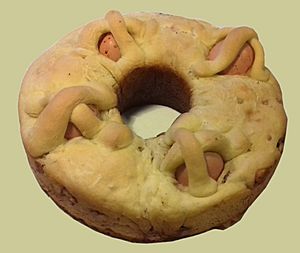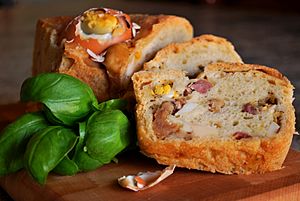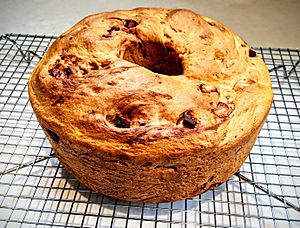Casatiello facts for kids

A casatiello in Rome in 2017
|
|
| Type | Easter bread |
|---|---|
| Course | Main dish |
| Place of origin | Italy |
| Region or state | Campania |
| Associated national cuisine | Italian |
| Serving temperature | Room temperature |
| Main ingredients | Wheat flour, salami, cheese, eggs, cracklings, lard, natural yeast |
| Variations | Baker's yeast |
Casatiello (pronounced cah-sah-tee-EH-loh) is a tasty, savory bread from Naples, Italy. People usually make it around the Easter holiday. It's made with flour, lard (a type of fat), cheese, salami, cracklings (crispy bits of pork), eggs, and black pepper. It's a special kind of bread that rises, like regular bread, making it soft and fluffy.
Contents
What's in a Name?
The name Casatiello likely comes from the Neapolitan language word caso. This word means 'cheese' in Italian. Since cheese is a main ingredient in this bread, it makes sense that it's named after it!
A Look Back in Time
Casatiello has been around for a long time, at least since the 1600s! We know this because it's mentioned in an old folk tale called La gatta Cenerentola (which means "Cinderella the Cat"). This story was written by Giambattista Basile, a writer from Naples, between 1634 and 1636.
Casatiello in an Old Story
In the story, there's a part where the king is celebrating to find the girl who lost her slipper. The story describes a huge feast:
|
E, venuto lo juorno destenato, oh bene mio: che mazzecatorio e che bazzara che se facette! Da dove vennero tante pastiere e casatielle? Dove li sottestate e le porpette? Dove li maccarune e graviuole? Tanto che 'nce poteva magnare n'asserceto formato. |
And when the special day came, oh my goodness: what a feast and what a party! Where did so many pastiere (another Easter food) and casatielli come from? Where did the stews and meatballs come from? Where did the macaroni and ravioli come from? There was so much food that a whole army could eat! |
This shows that Casatiello was a well-known and important food for celebrations back then.
Casatiello in the 1800s
Later, in the 1800s, Casatiello was also mentioned in a book called Costumi e tradizioni di Napoli e dintorni (Customs and traditions of Naples and the surrounding area). This book, published in 1858, was put together by Francesco De Bourcard. He wrote that casatello (another way to say it) was baked at home for Easter lunch. People would even give it as a gift to their neighbors and helpers.
How It's Made
Casatiello is made from a special bread dough. This dough is made richer by adding cheese (often smoked scamorza, but also pecorino and some parmesan), lard, cicoli (crispy bits of pork), and other cured meats like salami.
Baking the Bread
The dough is shaped like a doughnut and put into a special baking pan. Then, it needs to rise for a long time, usually at least 12 hours. If you use a faster yeast, it might only take about two hours. After rising, the bread is baked, often in a traditional wood-fired oven.
Easter Traditions
People usually prepare Casatiello on Good Friday. They let it rise overnight and then bake it the next day. It's often eaten on Holy Saturday and Easter Monday.
The shape of the Casatiello has special meaning for Easter. The strips of dough that hold the eggs in place are said to represent the cross where Jesus died. The round shape of the bread reminds people of the never-ending cycle of the Easter resurrection and also of Christ's crown of thorns.
When baking, the eggs are placed whole into the dough. Some bakers put them in raw, while others use eggs that have already been hard-boiled. The bread bakes at about 170°C (338°F) for around 60 minutes.
Enjoying Casatiello
Casatiello is also a popular food to bring for a packed lunch during traditional trips out of town on Easter Monday. This kind of trip is called "Gite fuori porta" in Italian.
Casatiello stays good for about two or three days. After that, it starts to get harder. In Naples, a stale (old and hard) casatiello is sometimes called "ammazzaruto," which means "not risen enough" or simply "hard."
Different Kinds of Casatiello
There's a bread called Tortano that is very similar to Casatiello. The main differences are:
- Eggs: In Casatiello, whole eggs are placed on top of the bread. In Tortano, hard-boiled eggs are cut into small pieces and mixed into the dough.
- Meats: Casatiello has cured meats like salami mixed into its dough. Tortano usually doesn't have these meats inside.
Sweet Casatiello
There's also a sweet version of Casatiello! Its main ingredients are eggs, sugar, lard, and icing. It's often decorated with colorful candies called diavulilli (which means "little devils" in Neapolitan). This sweet version is popular in areas like Caserta, the island of Procida, and near Benevento and Mount Vesuvius.
Casatiello in Everyday Talk
Because Casatiello can be a very filling and "heavy" dish, people in Naples sometimes say, "Sí proprio 'nu casatiéllo." This means "You are really a casatiello." It's a way of saying that someone is a good person, but also a bit boring or hard to deal with, like a heavy meal!
See also
 In Spanish: Casatiello para niños
In Spanish: Casatiello para niños
 | Aurelia Browder |
 | Nannie Helen Burroughs |
 | Michelle Alexander |




